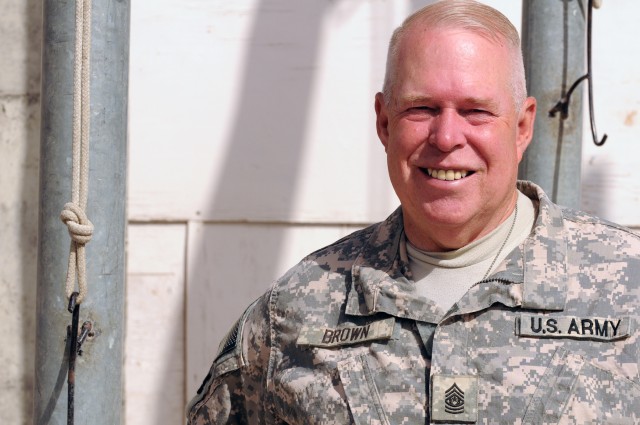
PAKTYA PROVINCE, Afghanistan- Having served with the 101st Airborne Division in two wars in a career spanning more than four decades, U.S. Army Command Sgt. Maj. James M. Brown brings a unique perspective to the current conflict in Afghanistan.
Brown, who hails from Indianapolis, grew up in Los Angeles in a "patriotic, old-fashion family" of southern extraction. As part of his heritage, he retains his admiration for confederate Gen. Robert E. Lee.
During the Vietnam War, Brown joined the Army and completed basic training and noncommissioned officers' training successively before gaining any field experience. Those who went through this process were called "Shake 'n Bake" sergeants because of how quickly they got their stripes. After completing his training, Brown deployed to Vietnam from 1969 to 1971, where he served as a squad leader in the infantry under the 101st Airborne Div.
Brown spoke candidly of the courage and sacrifice that the Vietnam War required.
"During those difficult times you need to do difficult things," he said. "You're no more important than anybody else."
However, Brown added, "What I learned from that, looking back, is that it's probably good for the country to have some kind of mandatory service for about four years. I also learned that there is honor in that kind of service."
Following his service in Vietnam, Brown remained in the inactive reserve and the National Guard, never serving far from the Indianapolis area. In the civilian world, he worked in the transportation business and eventually came to own an Indiana transportation company that includes buses and limousines for the airport and city. He continued to ascend the enlisted ranks in a number of units until, in 2002, he became the 38th Infantry Div. command sergeant major.
In 2006, Brown became the Indiana state command sergeant major working for the state adjutant general. Units in the state had done 70 deployments since the Sept. 11, 2001, terrorist attacks, and Brown felt uncomfortable being in a position where he was sending others to war while he remained behind.
"My feeling is, 'don't ask others to do things you wouldn't do yourself,'" he said.
So when the opportunity to volunteer for his current deployment to Afghanistan arose, Brown left behind his wife, Cheryl, six children and eight grandchildren. He said though it has been difficult, his wife understood of his sense of obligation.
Brown and the other Indiana Guardsmen arrived at Forward Operating Base Lightning, Paktya province, mid-February, replacing the Tennessee National Guard Soldiers who preceded them. Brown and a few other Indiana National Guardsmen are completing their tour in Afghanistan as a part of a perennially deployed partnership unit, which currently goes by the moniker "Regional Corps Training Team II."
Brown's part of this involves mentoring the NCOs in the Afghan National Army's 203rd Thunder Corps.
"My job is to help 30-year-olds think like 50-year-olds," Brown said of his assignment, adding that it sometimes requires "The patience of Job."
One anecdote he related demonstrates the cultural differences. He spoke to an Afghan supply sergeant who was staggered by the idea that he'd need to order 1,500 bars of soap several weeks in advance of the course's beginning for several hundred soldiers. Hard for him to grasp, having come from a small village, he had never imagined dealing with bars of soap in such quantities.
Others might be discouraged by such challenges, but Brown, a self-described student of history, is able to put them in perspective.
"Washington couldn't get shoes for the Soldiers at Valley Forge because the Continental Congress would not give him the money." And that, Brown noted, was after inheriting military habits from the Prussians, who already had a good grasp of long-term planning. The Afghans, on the other hand, have fought for thousands of years only at the squad-level and have never had to deal with large-scale issues of supply and demand.
As for the rapid build-up of the ANA that is happening now, Brown points out that the U.S. was in a similar spot during World War I, World War II and the Korean War. The U.S. needed to field an Army quickly and had several different kinds of programs. He didn't need to mention his own experience as "Shake 'n Bake" sergeant, but could have.
Nor has the symmetry of his own career been lost on him, he said.
"Going into a unit with a historical reputation was a pleasure ... coming back and serving with that same unit years later - wearing the [screaming eagle] patch on both shoulders - is an honor," Brown said. "They were a great outfit then, and they remain a great outfit today."

Social Sharing